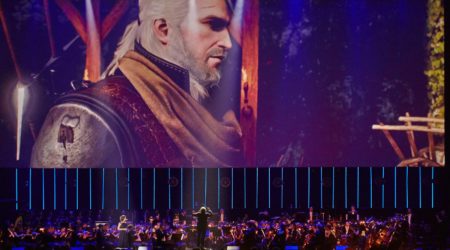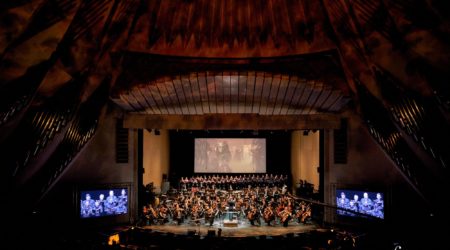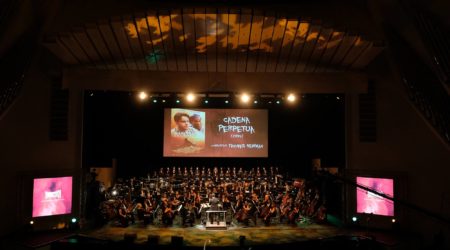We still owe you one interview that was conducted during the Fimucité film music festival on the island of Tenerife. After interviews with the fantastic composers Daniel Pemberton and Trevor Jones, we finish our sequence of Fimucité interviews with the Irish composer and conductor Eímear Noone, who brilliantly conducted the Sword & Sorcery concert – one of the festival’s big events on Saturday night. She made her name as a composer for video game scores, her most famous one being Warcraft: Warlords of Draenor.
Anton Smit: Could you tell, for the people who do not know you, who you are and what you do?
Eímear Noone: I am a conductor and a composer for media, meaning I write music for video games, film, and TV. I come from Ireland and I have a background as a classical musician. I’ve been living in Los Angeles for the last twelve years and I have had some great opportunities to work on some fantastic projects – this festival being one of them.
AS: How do you like it here, is Tenerife different than your own island?
EN: Well the obvious difference is the weather, but actually the people are very similar. The open-hearted kindness of people on Tenerife reminds me of Ireland.
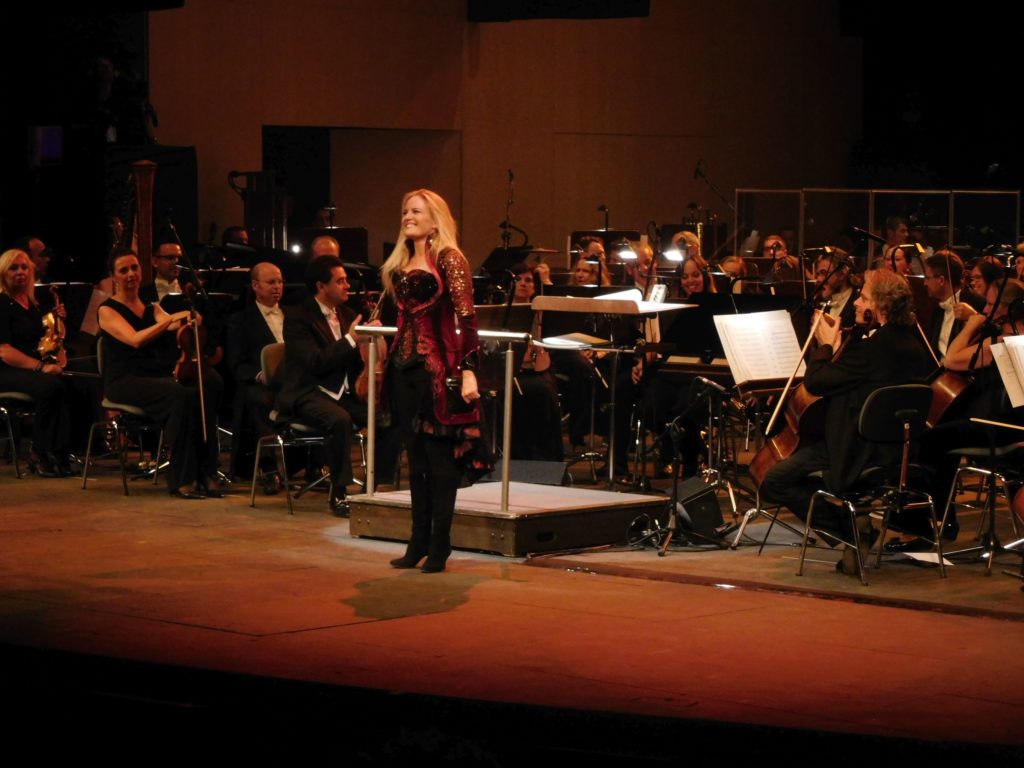
AS: As a composer for different kinds of media, is there a difference between writing for games and for other media?
EN: There are some technological differences and there is also a sort of style that becomes known for it. Most video games I would work on would be fantasy games. There is an epic style that has become part of that type of game, and that style is also appropriate for certain types of movies. One of the things that we do not have to worry about as much in video game scoring is stepping on dialogue. When you are scoring for a film, you always have to be careful about how you approach the dialogue in the film. In video game scoring, a cinematic is like that. It is like scoring a mini-movie. But inside the gameplay, you often have a lot more musical freedom.
AS: You work a lot for the big game company Blizzard: you conduct a lot for them and you have composed music for their games, e.g.World of Warcraft: Warlord of Draenor. How is it to work for such a large company?
EN: The guys at Blizzard are so creative. We are given the best of everything: a great orchestra, huge choirs and a great team. Everybody is really geeky and passionate about what they do, every single one of us in our own area. When talking to the directors and artists, you realize that these people are just as intense about what they are doing as you are about the music. It makes your job actually easier because we are all going for an AAA standard and everything just works.
AS: On a game like World of Warcraft, when do you start? Do you have images to work with, do you have cinematics, and is background music written while players can already walk in the world?
EN: All of that! When we were working on Draenor, one of the first things that happened was that we did some experimental recording sessions. We were working with seven composers because there was so much music required. We were working from very beautiful and expressive still images that were very inspiring. It was easy to write the music while looking at what the artists had created. What happened was that the music we wrote was fed back to the animators, the directors and producers. They would come back to us with something else and that went back and forth. One of the differences with scoring a video game is that the process is a lot more collaborative and it takes a lot longer. It is not a situation where the game is absolutely complete, where you are being brought in at the very end and have a really short period to do it. The cinematics is like that, but the gameplay is a collaborative process over time.
AS: You also conduct the Video Games Live tours. Is there a difference between gamers and regular concertgoers?
EN: That is a very simple answer: gamers are the best audience, bar none. They are just the greatest. The passion, the appreciation, the love and the support we get when we are on stage and when we are off stage: it is among the greatest experiences to perform for that audience. They make us feel like we are the Rolling Stones. The audience for film scores, on the other hand, is very appreciative and musically literate. These people appreciate being moved by orchestral music and that is a particular type of person. It is somebody who knows on a higher level what we are doing. It is a different audience, passionate in a different way. There is definitely a large cross-over and at the concert here on Fimucité, we have film scores and two game scores. But I tell you, going to the Video Games Live concert is like going to a rock concert. All the craziness comes from the creator Tommy Tallarico. He is great fun, it is exactly what you think when you see us on stage. We are having the best time.
AS: You had a project in Ireland connected to the Zelda game series, could you tell us something about it?
EN: It is an album called The Celtic Link. On it there are traditional Irish musicians playing the themes from the game Zelda, through the idiom of traditional Irish music. It is a project that came about as part of the iDIG Music Fest, which is a festival of video game music that my husband Craig Stuart Garfinkle and I set up in Dublin and we are also launching the album at the festival. The performance was so popular at the festival, that the audience asked us there and then to make a record. So we kickstarted it, and 1248 people backed this little album. It is a crazy concept, you would never come up with it in isolation. It is only that it happened so organically inside of this festival in Dublin. The fact is that I have been on the road for two years with Zelda: Symphony of the Goddesses, constantly asking the concertmasters of orchestras to play “The Windwaker Theme” like it was a traditional Irish fiddle part. I was like, how did Koji Kondo write Irish music, I don’t understand, but it works! Zelda has three Goddesses, in Irish mythology, the island of Ireland was founded by three Goddesses as well. It is similar, each one is having a different power. But Kondo-san’s score has this traditional Irish influence, and I got to know that music so intimately and so well. I just thought that it made sense, using traditional Irish musicians, to give it that feeling. Also, having grown up with Trevor Jones’ scores – I am conducting his score of Excalibur tonight, and there is The Dark Crystal and The Last of the Mohicans – he was so great in combining traditional instruments or medieval instruments with the orchestra. I always loved that sound and thought it a good idea to create a Hylian band, like a team of musicians with their instruments slung over their back, going through Hyrule on an adventure. The entire album has that feel. “The Song of Storms” begins with a storm and of course we have an ocarina in there. It has been really fun, and the support from the fan base is ridiculous. We had to create something good. We just owe it to all these beautiful people who believed we could do it.
For the CD, we have captured the electricity of the live performance, but we have added to it because you can in a studio. Like the final piece is a seven and a half minute epic track, where we have a huge orchestra with nine trumpets, and inside of that, we have this traditional dialogue between the traditional Irish musicians and the orchestra. In my imagination, they walk through the land of Hyrule. They are bewitched by this ocarina player, they go into Hyrule and they are walking through the city of Hylia, and there are nine trumpet players on the walls playing [Noone sings a fast variation of the Zelda theme] all around them. They are completely overwhelmed, and they find themselves straight away into a boss fight battle! Eventually, the Goddesses bring calm to the music and then they join forces with the people of Hyrule with “The Windwaker theme.” It finishes with the farewell from the huge orchestra and trumpet players and finishes with a little ocarina joke. So we went there, we went all out nerd!
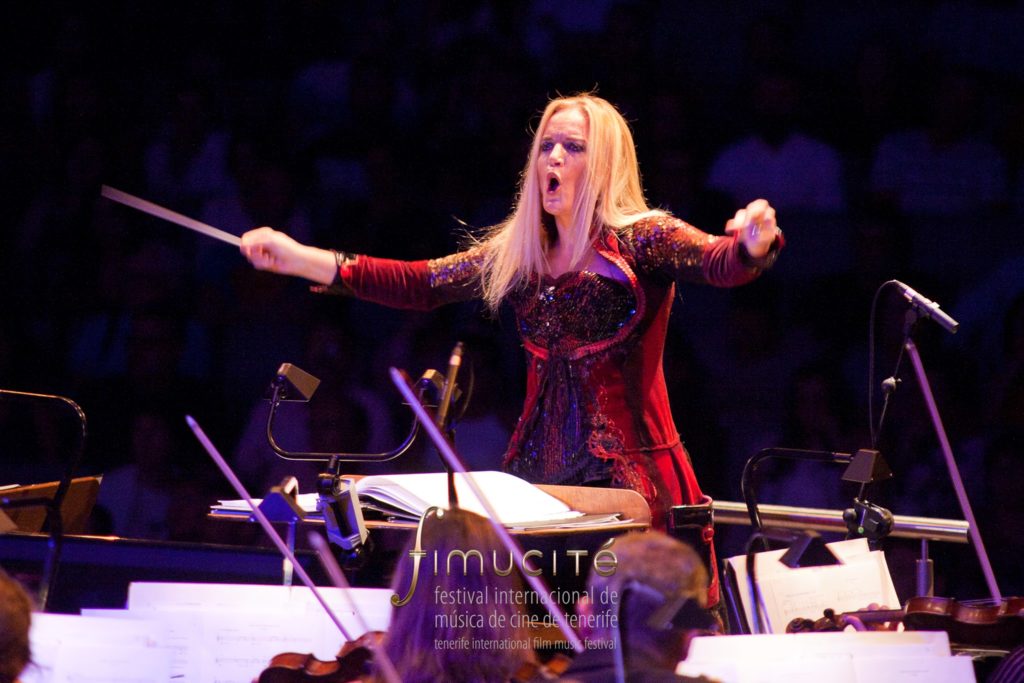
AS: For this evening’s concert you will be conducting quite some epic music, for example from Daniel Pemberton’s King Arthur and classics by Trevor Jones. What can we expect?
EN: The way Daniel writes for the strings, he makes them sound like eerie instruments. It is a kind of a scratchy, grainy sound, it is almost like they are going through a distortion pedal, but it is purely live and it rocks the string section. I absolutely love his music, and he has got a unique voice as well. It’ll sound a little different from the score because we are not using any electronic elements. It is purely a live interpretation of the score, but it is pretty cool.
It is also such an honor to conduct the music of Trevor Jones. I remember being a kid and watching Last of the Mohicans and waiting to see the credits to find out who wrote the music. I must have been like eight years old. Now to conduct his music is full circle for me. I set up an orchestra to perform when I was nineteen in Dublin and the honorary patron of the orchestra was John Boorman, and he would come to our concerts. To conduct a score of Trevor from a John Boorman movie, who lives in Ireland, is just this crazy amount of emotion for me.
I am also conducting the premiere of a piece by my husband of Baldur’s Gate: Dark Alliance 2 that is an emotional experience. My friend Atli Örvarsson, who I have known for more than ten years premiering his piece. It is a very different experience when I am performing my friends’ and my heroes’ music. It is a lot more responsibility, a lot more emotional and I want to give it everything I’ve got. When I am performing their piece, I am performing it for them. Hopefully, everybody else will like it too, [laughs] but I am directing it at them. You couldn’t have a scarier audience than the composers themselves.
[Noone’s husband Craig Stuart Garfinkle joins us while we were rounding up the interview]
EN: This is the first live performance of his piece Baldur’s Gate ever! It was not even recorded with a live orchestra.
Craig Stuart Garfinkle: The short story is, the company I was working for went bankrupt while I was doing the score. I did four games with them, and it did not even occur to me that something like that would happen, but unfortunately, it did. I always intended that to be an orchestral score, but then the whole thing got thrown into turmoil. They had to finish the project, what actually ended up in the game were the equivalent of my MIDI mockups. They were okay, but it was supposed to be an orchestral score. The first time I heard it with a real orchestra was two days ago during rehearsal, and I did that game, sixteen or seventeen years ago.
AS: Last quick question: What can we expect in the future?
EN: I have no idea, absolutely none! I am not going to stop what I am doing, so please universe send me some cool projects to work on. But there are a lot of things going on. We are concentrating on our own iDIG Festival. I am touring with Video Games Live. The other thing is we are creating some of the first motion captures of a conductor, and we are getting into 360 degrees video. We are creating a project called Conductrix, which is a 360° video of conducting techniques for students to learn to do what I do – in a 360° environment. When you are studying conducting, you are looking at someone in front of you, but they are doing the opposite of what you want to do.
CSG: There is a lot!
AS: Thank you so much for the interview!

